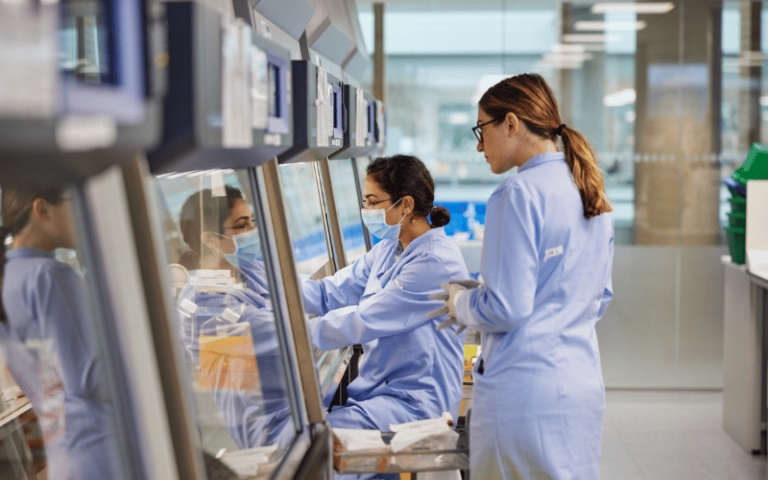UCL research offering new hope for people with difficult-to-treat cancers
Ground-breaking UCL research into T-cells could mean new treatment possibilities for patients with cancers that have failed to respond to standard therapies.

25 August 2023
T-cell therapies are one of the newest, most promising developments in cancer treatment to emerge in recent years. The new therapies harness cells that naturally occur in the body, and reprogramme them to fight cancer.
Offering a non-toxic alternative to treatments like chemotherapy, T-cell therapies can also be used in a more targeted way than other treatments. This could lead to more effective therapies being developed, particularly for blood cancers and cancers that tend not to respond well to chemotherapy or radiotherapy.
Programming T cells to fight cancer
T-cells are a naturally occurring part of our immune system that normally kill infected cells. But in cancers, it can be difficult for these cells to recognise the difference between a cancer cell and a normal one. So the cancer can hide away and go unnoticed.
However, thanks to new research scientists have found a way to reprogramme T-cells so they can recognise and fight cancer cells in the body, just as they would naturally attack an infection.
This programming works by taking T-cells from a person’s blood sample and introducing a gene for an artificial protein called a chimeric antigen receptor, or CAR.
The cells can then be programmed to develop precisely targeted T-cell therapies which are capable of recognising cancer cells, breaking down their defences, and killing them.
Clinical trials have shown that CAR T-cells could be highly effective in treating patients with leukaemias and lymphomas that have failed to respond to standard anti-cancer treatments. They also show promise in the treatment of solid tumours.
Leading the way at UCL
The new therapies have evolved from research conducted by Dr Martin Pule and his team at the UCL Cancer Institute and NIHR University College London Hospitals (UCLH) Biomedical Research Centre.
Dr Pule is Clinical Senior Lecturer in the Department of Haematology at the UCL Cancer Institute. His research is focused on many aspects of the genetic engineering of T-cells for cancer treatment, with a particular focus on CARs.
Dr Claire Roddie is an Associate Professor of Haematology at the UCL Cancer Institute and a Consultant Haematologist at UCLH. She leads the CAR T-cell manufacturing team and is the principal investigator in clinical studies testing CAR T-cells in patients with leukaemia and lymphoma.
Dr Roddie explains: “A large focus of our work has been on minimising the toxicity associated with CAR-T therapy while maximising how long CAR T-cells survive in the patient’s bloodstream. This makes CAR-T therapy safer and more accessible, even in older patients. By ensuring that manufactured CAR-T cells survive for long periods in the blood, we're hopeful our new treatments can result in long-lasting remissions in patients with otherwise incurable cancer.”
The journey to commercialisation
The UCL research was commercialised into a spinout company called Autolus in September 2014. The spinout process was supported by UCL Business (UCLB), UCL’s commercialisation company, and founded with additional funding from a BBSRC Sparking Impact award.
The company raised £30 million in investment from venture capital firm Syncona Partners. At the time this was one of the largest ever ‘Series A’ financing round for a European biotechnology company.
That was followed by ‘Series B’ funding of £40 million and ‘Series C’ funding of $80 million (£59 million), before an Initial Public Offering (IPO) in June 2018.
Richard Fagan is UCLB’s Director of BioPharm, and was closely involved in the commercialisation of the research. UCLB worked with Dr Pule to protect the technology, securing a suite of patents and supported the company set up process, including making introductions to potential investors.
Richard says: “I am delighted to see Autolus going from strength to strength. Their lead programme is progressing excellently in the clinic and the company has recently announced positive results from their pivotal phase 2 study in leukaemia patients. I look forward to the continued success of the company.”
Dr Pule adds: “I’m grateful for the excellent support we received from UCLB in establishing Autolus. Commercialisation of therapeutics either through spinout companies or licensing is essential for making new therapies available routinely to NHS patients.”
From bench to bedside
Autolus are now using their expertise to develop advanced T-cell therapies that have the potential to deliver life-changing benefits to cancer patients.
The breadth of the Autolus technology platform, licensed from UCLB at company formation, allows the company to select from a range of programming modules. This modular approach will facilitate the development of therapies to address the specific cancer being targeted, or to improve established therapies.
A number of products are currently in development to treat cancers that start in blood-forming tissue (such as leukaemia and lymphoma), as well as one solid tumour programme.
Ian Matrubhutam is one of the patients who is already benefitting from the new treatment. Ian has a diagnosis of follicular lymphoma, and was being treated at his local hospital when he was introduced to the trial.
“When I found out about the new CAR-T trial, I'd basically run out of options. I was apprehensive at first but the treatment I’ve received has been excellent so far, and the trial has gone very well. If I didn’t get a chance to take part in this, my time would have been up. So really it’s given me a new chance of life.”
Links
Find out more about:
- how UCL is transforming lives through collaboration and knowledge exchange
- UCL Cancer Institute
- UCL CAR T-cell programme
- Support from UCLB to help UCL staff commercialise their research
- Autolus
Photo © Autolus
 Close
Close

